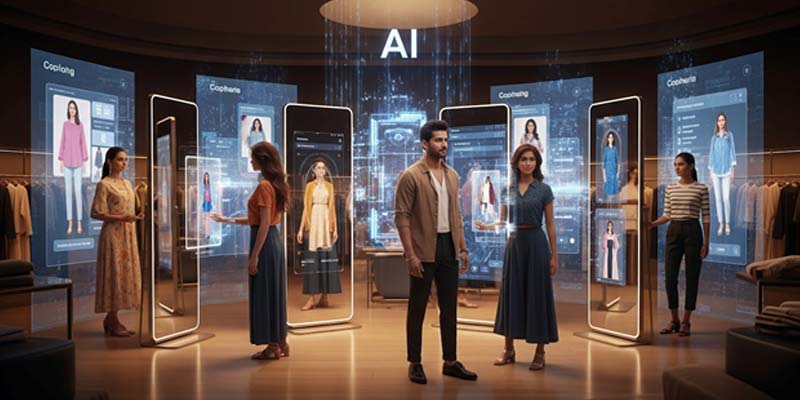How AI Is Revolutionising Fashion Personalisation Marketing in India

In today’s rapidly evolving fashion-retail world, delivering customised experiences is no longer a luxury—it’s a necessity. Brands striving to stay ahead are leveraging fashion personalisation marketing tools and investing in AI marketing in fashion in India to elevate the shopping experience, boost customer engagement, and build loyal customers. From smart supply chain analytics to generative AI creative generation, the full spectrum of personalization strategies is transforming how fashion brands connect with their customer base.
1. The Rise of AI-Powered Personalised Marketing in Fashion
Fashion retail has always been about identifying trends, talking to the right audience, and cultivating relationships. The advent of machine learning, big data, and generative AI allows fashion brands to go beyond broad demographic segments and deliver individualised experiences across the customer journey. According to a recent NASSCOM / industry report, the AI in fashion market is expected to grow from USD 1.26 billion in 2024 to USD 1.77 billion by 2025—delivering a 40 %+ increase. (NASSCOM Community)
In India in particular, research shows that 77 % of shoppers prefer retailers that use AI-powered personalised recommendations—and brands using such tools are 48 % more likely to exceed revenue goals. (Howays) These figures underscore the critical role of AI in Marketing Automation in real life, enabling brands to segment, engage, and convert efficiently.
2. Key Personalisation Strategies Fashion Brands Are Adopting
Customer Segmentation & Machine Learning
Via advanced analytics, brands can carve the customer base into micro-segments based on behaviour, purchase history, browsing patterns, and social data. This enables personalized marketing offers and communications targeted to preferences. (arXiv)
Segmentation combined with machine learning means marketing strategies become data-driven, dynamic, and responsive.
Generative AI & Creative Automation
Modern fashion personalisation marketing tools now include generative AI for content creation—rapidly producing visuals, copy, and even entire campaign assets customised for a segment or individual. (ETRetail.com) This brings speed, cost-efficiency and relevance to campaigns.
Tailored Shopping Experience & Customer Journey
From homepage banners, bespoke offers to recommendations and virtual try-ons, the personalized journey is being powered by AI-based real-time data. For example, tools analyse what a customer browses, what they scroll past, their past repeat purchases, and then present customised suggestions. (HashStudioz)
This predication and customisation foster deeper customer engagement and drive repeat purchases.
Supply Chain & Inventory Intelligence
Beyond front-end marketing, fashion brands are using AI in their supply chain to ensure the right products reach the right markets at the right time. It ensures the personalization at scale is operationally supported, enabling brands to deliver tailored assortments and timely promotions. (The Knowledge Company)
Thus, the full ecosystem—from creation to delivery—aligns with personalization strategies.
3. Why This Matters: The Business Case for Personalisation
Personalised experiences yield measurable benefits. According to industry stats:
- Customers are more likely to buy when the experience is tailored, with up to 80 % more likely to purchase when personalized experiences are offered. (SuperAGI)
- Conversion rates and average order values improve when brands employ AI-driven recommendations.
- By focusing on customer engagement and loyalty, tailored marketing drives repeat purchases, builds loyal customers, and enhances lifetime value.
And importantly, AI is Important for Business Growth — in the fashion context, leveraging AI for personalization doesn’t just optimize cost but opens new revenue streams and deeper relationships.
In the Indian context, with vast customer diversity in tastes, geographies and buying behaviour, adopting AI marketing in fashion India through sophisticated personalisation has become a key differentiator.
4. Fashion Personalisation Marketing Tools in Action: India Spotlight
Brands and platforms in India are embracing these tools to scale personalization:
- Platforms are using AI-powered virtual try‐ons, size-and-fit recommendation engines, and personalised product carousels for the Indian market.
- Fashion brands are deploying generative AI to create customised visuals and campaigns, accelerating time-to-market and boosting relevance. Source
- AI is being applied in supply chain and production — enabling fashion brands in India to respond to trend changes faster and deliver customised assortments.
In short, the combination of fashion personalisation marketing tools and AI marketing in fashion India is helping brands shift from “one-size-fits-all” to “one-size-fits-me”.

5. Best Practices & Implementation Tips for Marketers
For marketing leaders (especially in skincare, beauty-adjacent fashion, or premium fashion brands), here are some focused suggestions to harness this trend:
- Start with clean customer data: Ensure you have a unified customer view—purchase history, browsing behaviour, social signals. Without quality customer data, AI models underperform.
- Layer intelligence into customer segmentation: Use machine learning to go beyond age/gender and detect style preferences, repeat-purchase behaviour, loyalty signals, and micro-segments.
- Leverage content automation tools: Use generative AI to create variant creatives (visuals, copy) tailored to each segment or individual. This reduces turnaround time and boosts relevance.
- Integrate personalization across the touchpoint journey: From social media ads to website, email, and in-store experiences—the customer ought to feel a seamless, customised journey.
- Measure loyalty and repeat purchases: While new-customer acquisition is important, personalised strategies are highly effective in driving repeat purchases and building loyal customers.
- Maintain ethical data use and transparency: As personalization deepens, issues around privacy, data use, and bias grow. In India, compliance with data-protection regulations and ethical use of AI must be baked into marketing strategies. (Journal of Marketing & Social Research)
- Future-proof with generative AI and creative-at-scale: Conversational AI in shaping the future of PPC (pay-per-click) and marketing campaigns must be part of your roadmap. For example, chatbots and conversational assistants powered by AI can enhance personalised dialogues and drive engagement.
- Blend human creativity with machine efficiency: Even the best personalised marketing needs brand-led storytelling to retain emotional connection. AI is a turbo-charger, not a replacement for human insight.
6. Challenges & Considerations
While the opportunity is enormous, several challenges need attention:
- Data Privacy & Compliance: Collecting rich customer data for personalization must comply with regulations. In India, evolving laws like the Digital Personal Data Protection Act require careful consideration. (Journal of Marketing & Social Research)
- Algorithmic Bias & Fairness: If personalization engines are biased (for instance, over-representing male or urban segments), brands risk alienating large parts of their customer base.
- Integration with Supply Chain & Operations: Personalised offers and assortments must be supported by the supply chain. If not, customers may be disappointed. Source
- Balancing Speed with Authenticity: Generative AI enables rapid creative output, but fashion marketing still relies on authenticity, brand identity, and emotional resonance—so strategy must balance both. (ETRetail.com)
- Cost & Scalability: Implementing advanced AI tools and personalization strategies requires investment in tech and talent. Smaller brands must evaluate ROI carefully.
7. The Future: What’s Next in Personalised Fashion Marketing?
- Hyper-personalisation: Moving beyond segment-based to true individual tailoring. Real-time data, multi-device behaviour, and context will drive experiences where no two customers see the same content. (Glance)
- Visual & Emotion-based Personalisation: AI models will analyse selfies, body type, mood, and even lighting to tailor fashion suggestions in real time. Source
- Embedded AI in Supply Chain & Sustainability: Personalisation will increasingly factor in sustainability preferences, made-to-order models, waste reduction, and smart manufacturing. (Fibre2Fashio)
- Conversational AI & Shopping Assistants: As mentioned, conversational AI in shaping the future of PPC and consumer engagement will enable two-way personalised dialogues—guided shopping, style advice, and upsell triggers.
- Brand-Led Co-Creation with Customers: Fashion brands will invite customers into co-creation via personality profiles, preferences, avatars—creating deeper engagement and a sense of ownership.

Conclusion
The convergence of fashion personalisation marketing tools and AI marketing in fashion India is redefining how brands engage, acquire, and retain customers. For fashion brands and marketers, this means moving from broad-brush campaigns to deeply tailored experiences—powered by machine learning, creative generative AI, and customer-centric thinking. With the right data, tools, and strategy, brands can create customised experiences that drive better engagement, repeat purchases, and long-term customer loyalty.
As you consider your brand’s next marketing evolution, remember: AI isn’t just a tech upgrade—it’s a strategic engine for personalization, relevance, and business growth. The time to act is now, so your brand doesn’t just participate in fashion retail—but leads it.



